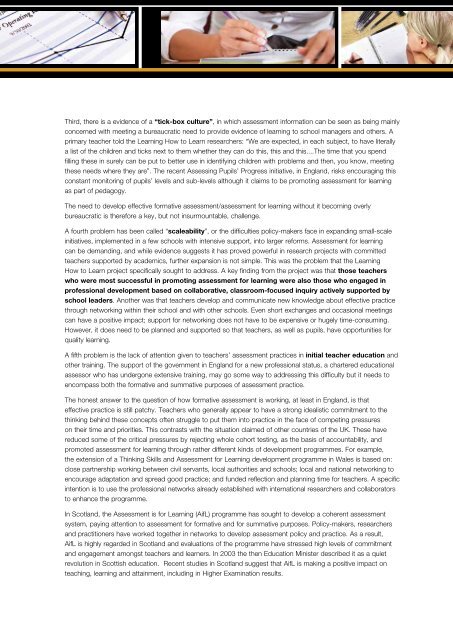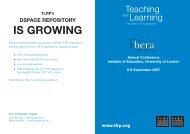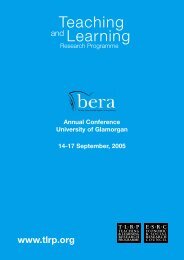Assessment in schools Fit for purpose? - Teaching and Learning ...
Assessment in schools Fit for purpose? - Teaching and Learning ...
Assessment in schools Fit for purpose? - Teaching and Learning ...
Create successful ePaper yourself
Turn your PDF publications into a flip-book with our unique Google optimized e-Paper software.
Third, there is a evidence of a “tick-box culture”, <strong>in</strong> which assessment <strong>in</strong><strong>for</strong>mation can be seen as be<strong>in</strong>g ma<strong>in</strong>ly<br />
concerned with meet<strong>in</strong>g a bureaucratic need to provide evidence of learn<strong>in</strong>g to school managers <strong>and</strong> others. A<br />
primary teacher told the Learn<strong>in</strong>g How to Learn researchers: “We are expected, <strong>in</strong> each subject, to have literally<br />
a list of the children <strong>and</strong> ticks next to them whether they can do this, this <strong>and</strong> this....The time that you spend<br />
fill<strong>in</strong>g these <strong>in</strong> surely can be put to better use <strong>in</strong> identify<strong>in</strong>g children with problems <strong>and</strong> then, you know, meet<strong>in</strong>g<br />
these needs where they are”. The recent Assess<strong>in</strong>g Pupils’ Progress <strong>in</strong>itiative, <strong>in</strong> Engl<strong>and</strong>, risks encourag<strong>in</strong>g this<br />
constant monitor<strong>in</strong>g of pupils’ levels <strong>and</strong> sub-levels although it claims to be promot<strong>in</strong>g assessment <strong>for</strong> learn<strong>in</strong>g<br />
as part of pedagogy.<br />
The need to develop effective <strong>for</strong>mative assessment/assessment <strong>for</strong> learn<strong>in</strong>g without it becom<strong>in</strong>g overly<br />
bureaucratic is there<strong>for</strong>e a key, but not <strong>in</strong>surmountable, challenge.<br />
A fourth problem has been called “scaleability”, or the difficulties policy-makers face <strong>in</strong> exp<strong>and</strong><strong>in</strong>g small-scale<br />
<strong>in</strong>itiatives, implemented <strong>in</strong> a few <strong>schools</strong> with <strong>in</strong>tensive support, <strong>in</strong>to larger re<strong>for</strong>ms. <strong>Assessment</strong> <strong>for</strong> learn<strong>in</strong>g<br />
can be dem<strong>and</strong><strong>in</strong>g, <strong>and</strong> while evidence suggests it has proved powerful <strong>in</strong> research projects with committed<br />
teachers supported by academics, further expansion is not simple. This was the problem that the Learn<strong>in</strong>g<br />
How to Learn project specifically sought to address. A key f<strong>in</strong>d<strong>in</strong>g from the project was that those teachers<br />
who were most successful <strong>in</strong> promot<strong>in</strong>g assessment <strong>for</strong> learn<strong>in</strong>g were also those who engaged <strong>in</strong><br />
professional development based on collaborative, classroom-focused <strong>in</strong>quiry actively supported by<br />
school leaders. Another was that teachers develop <strong>and</strong> communicate new knowledge about effective practice<br />
through network<strong>in</strong>g with<strong>in</strong> their school <strong>and</strong> with other <strong>schools</strong>. Even short exchanges <strong>and</strong> occasional meet<strong>in</strong>gs<br />
can have a positive impact; support <strong>for</strong> network<strong>in</strong>g does not have to be expensive or hugely time-consum<strong>in</strong>g.<br />
However, it does need to be planned <strong>and</strong> supported so that teachers, as well as pupils, have opportunities <strong>for</strong><br />
quality learn<strong>in</strong>g.<br />
A fifth problem is the lack of attention given to teachers’ assessment practices <strong>in</strong> <strong>in</strong>itial teacher education <strong>and</strong><br />
other tra<strong>in</strong><strong>in</strong>g. The support of the government <strong>in</strong> Engl<strong>and</strong> <strong>for</strong> a new professional status, a chartered educational<br />
assessor who has undergone extensive tra<strong>in</strong><strong>in</strong>g, may go some way to address<strong>in</strong>g this difficulty but it needs to<br />
encompass both the <strong>for</strong>mative <strong>and</strong> summative <strong>purpose</strong>s of assessment practice.<br />
The honest answer to the question of how <strong>for</strong>mative assessment is work<strong>in</strong>g, at least <strong>in</strong> Engl<strong>and</strong>, is that<br />
effective practice is still patchy. Teachers who generally appear to have a strong idealistic commitment to the<br />
th<strong>in</strong>k<strong>in</strong>g beh<strong>in</strong>d these concepts often struggle to put them <strong>in</strong>to practice <strong>in</strong> the face of compet<strong>in</strong>g pressures<br />
on their time <strong>and</strong> priorities. This contrasts with the situation claimed of other countries of the UK. These have<br />
reduced some of the critical pressures by reject<strong>in</strong>g whole cohort test<strong>in</strong>g, as the basis of accountability, <strong>and</strong><br />
promoted assessment <strong>for</strong> learn<strong>in</strong>g through rather different k<strong>in</strong>ds of development programmes. For example,<br />
the extension of a Th<strong>in</strong>k<strong>in</strong>g Skills <strong>and</strong> <strong>Assessment</strong> <strong>for</strong> Learn<strong>in</strong>g development programme <strong>in</strong> Wales is based on:<br />
close partnership work<strong>in</strong>g between civil servants, local authorities <strong>and</strong> <strong>schools</strong>; local <strong>and</strong> national network<strong>in</strong>g to<br />
encourage adaptation <strong>and</strong> spread good practice; <strong>and</strong> funded reflection <strong>and</strong> plann<strong>in</strong>g time <strong>for</strong> teachers. A specific<br />
<strong>in</strong>tention is to use the professional networks already established with <strong>in</strong>ternational researchers <strong>and</strong> collaborators<br />
to enhance the programme.<br />
In Scotl<strong>and</strong>, the <strong>Assessment</strong> is <strong>for</strong> Learn<strong>in</strong>g (AifL) programme has sought to develop a coherent assessment<br />
system, pay<strong>in</strong>g attention to assessment <strong>for</strong> <strong>for</strong>mative <strong>and</strong> <strong>for</strong> summative <strong>purpose</strong>s. Policy-makers, researchers<br />
<strong>and</strong> practitioners have worked together <strong>in</strong> networks to develop assessment policy <strong>and</strong> practice. As a result,<br />
AifL is highly regarded <strong>in</strong> Scotl<strong>and</strong> <strong>and</strong> evaluations of the programme have stressed high levels of commitment<br />
<strong>and</strong> engagement amongst teachers <strong>and</strong> learners. In 2003 the then Education M<strong>in</strong>ister described it as a quiet<br />
revolution <strong>in</strong> Scottish education. Recent studies <strong>in</strong> Scotl<strong>and</strong> suggest that AifL is mak<strong>in</strong>g a positive impact on<br />
teach<strong>in</strong>g, learn<strong>in</strong>g <strong>and</strong> atta<strong>in</strong>ment, <strong>in</strong>clud<strong>in</strong>g <strong>in</strong> Higher Exam<strong>in</strong>ation results.

















